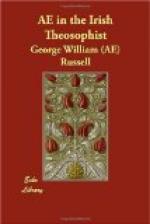I do not question but that the heroic age had its imperfections, or that it was not well that its too warlike ardour was tempered by the beautiful, pathetic and ennobling teaching of Christ. The seed of new doctrines bore indeed many lovely but exotic blossoms in the saintly times, and also many a noxious weed. For religion must always be an exotic which makes a far-off land sacred rather than the earth underfoot: where the Great Spirit whose home is the vast seems no more a moving glamour in the heavens, a dropping tenderness at twilight, a visionary light on the hills, a voice in man’s heart; when the way of life is sought in scrolls or is heard from another’s lips. The noxious weed, the unendurable bitter which mingled with the sweet and true in this exotic religion was the terrible power it put into the hands of men somewhat more learned in their ignorance of God than those whom they taught: the power to inflict a deadly wrong upon the soul, to coerce the will by terror from the course conscience had marked out as true and good. That power has been used unsparingly and at times with unspeakable cruelty whenever those who had it thought their influence was being assailed, for power is sweet and its use is not lightly laid aside.
As we read our island history there seems a ruddy emblazonry on every page, a hue shed from behind the visible, the soul dropping its red tears of fire over hopes for ever dissolving, noble ambitions for ever foiled. Always on the eve of success starts up some fatal figure weaponed with the keys of the hereafter, brandishing more especially the key of the place of torment, warning most particularly those who regard that that key shall not get rusty from want of turning if they disobey. It has been so from the beginning, from the time of the cursing of Tara, where the growing unity of the nations was split into fractions, down to the present time. I often doubt if the barbarities in eastern lands which we shudder at are in reality half so cruel, if they mean so much anguish as this threat of after-torture does to those who believe in the power of another to inflict it. It wounds the spirit to the heart: its consciousness of its own immortality becomes entwined with the terror of as long enduring pain. It is a lie which the all-compassionate Father-Spirit never breathed into the ears of his children, a lie which has been told here century after century with such insistence that half the nation has the manhood cowed out of it. The offence of the dead chief whose followers were recently assailed weighed light as a feather in the balance when compared with the sin of these men and their shameful misuse of religious authority in Meath a little while ago. The scenes which took place there, testified and sworn to by witness in the after trials, were only a copy of what generally took place. They will take place again if the necessity arises. That is a bitter fact.




